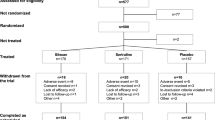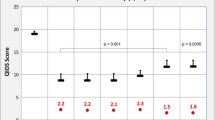Abstract
Fatigue and depression are common co-morbid conditions among people with HIV infection. We analyzed a population of HIV-infected adults with depression, who were enrolled in a depression treatment trial, to examine the extent to which improvements in depression over time were associated with improvements in HIV-related fatigue. Data for this analysis come from a randomized controlled trial to evaluate the effectiveness of improved depression treatment on antiretroviral adherence. Fatigue was measured using the HIV-Related Fatigue Scale, and depressive symptoms were measured with the Hamilton Depression Rating Scale. Participants (n = 234) were on average nearly 44 years of age and predominantly male, black or African American, and unemployed. Individuals who experienced stronger depression response (i.e., greater improvement in depression score) had larger decreases in fatigue. However, even among those who demonstrated a full depression response, nearly three-quarters continued to have either moderate or severe fatigue at 6 and 12 months.

Similar content being viewed by others
References
Erdbeer G, Sabranski M, Sonntag I, et al. Everything fine so far? Physical and mental health in HIV-infected patients with virological success and long-term exposure to antiretroviral therapy. J Int AIDS Soc. 2014;17(4 Suppl 3):19673.
Jong E, Oudhoff LA, Epskamp C, et al. Predictors and treatment strategies of HIV-related fatigue in the combined antiretroviral therapy era. AIDS. 2010;24(10):1387–405.
Barroso J, Harmon JL, Madison JL, Pence BW. Intensity, chronicity, circumstances, and consequences of HIV-related fatigue: a longitudinal study. Clin Nurs Res. 2014;23(5):514–28.
Bing EG, Burnam MA, Longshore D, et al. Psychiatric disorders and drug use among human immunodeficiency virus-infected adults in the United States. Arch Gen Psychiatry. 2001;58(8):721–8.
Orlando M, Burnam MA, Beckman R, et al. Re-estimating the prevalence of psychiatric disorders in a nationally representative sample of persons receiving care for HIV: results from the HIV Cost and Services Utilization Study. Int J Methods Psychiatr Res. 2002;11(2):75–82.
Pence BW, Miller WC, Whetten K, Eron JJ, Gaynes BN. Prevalence of DSM-IV-defined mood, anxiety, and substance use disorders in an HIV clinic in the Southeastern United States. J Acquir Immune Defic Syndr. 2006;42(3):298–306.
Barroso J. HIV-related fatigue. Am J Nurs. 2002;102(5):83–6.
Barroso J, Carlson JR, Meynell J. Physiological and psychological markers associated with HIV-related fatigue. Clin Nurs Res. 2003;12(1):49–68.
Barroso J, Hammill BG, Leserman J, Salahuddin N, Harmon JL, Pence BW. Physiological and psychosocial factors that predict HIV-related fatigue. AIDS Behav. 2010;14(6):1415–27.
Barroso J, Lynn MR. Psychometric properties of the HIV-Related Fatigue Scale. J Assoc Nurses AIDS Care. 2002;13(1):66–75.
Breitbart W, McDonald MV, Rosenfeld B, Monkman ND, Passik S. Fatigue in ambulatory AIDS patients. J Pain Symptom Manage. 1998;15(3):159–67.
Henderson M, Safa F, Easterbrook P, Hotopf M. Fatigue among HIV-infected patients in the era of highly active antiretroviral therapy. HIV Med. 2005;6(5):347–52.
Millikin CP, Rourke SB, Halman MH, Power C. Fatigue in HIV/AIDS is associated with depression and subjective neurocognitive complaints but not neuropsychological functioning. J Clin Exp Neuropsychol. 2003;25(2):201–15.
Paddison J, Fricchione G, Gandhi RT, Freudenreich O. Fatigue in psychiatric HIV patients: a pilot study of psychological correlates. Psychosomatics. 2009;50(5):455–60.
Schifitto G, Deng L, Yeh TM, et al. Clinical, laboratory, and neuroimaging characteristics of fatigue in HIV-infected individuals. J Neurovirol. 2011;17(1):17–25.
Voss JG. Predictors and Correlates of Fatigue in HIV/AIDS. J Pain Symptom Manage. 2005;29(2):173–84.
Jaggers JR, Hand GA, Dudgeon WD, et al. Aerobic and resistance training improves mood state among adults living with HIV. Int J Sports Med. 2015;36(2):175–81.
Barroso J, Leserman J, Harmon JL, Hammill B, Pence BW. Fatigue in HIV-Infected people: a three-year observational study. J Pain Symptom Manage. 2015;50(1):69–79.
Phillips KD, Sowell RL, Rojas M, Tavakoli A, Fulk LJ, Hand GA. Physiological and psychological correlates of fatigue in HIV disease. Biol Res Nurs. 2004;6(1):59–74.
Association AP. Diagnostic and statistical manual of mental disorders. 5th ed. Washington DC: APA; 2013.
Voss J, Portillo CJ, Holzemer WL, Dodd MJ. Symptoms cluster of fatigue and depression in HIV/AIDS. J Prev Interv Community. 2007;33:19–34.
Breitbart W, McDonald MV, Rosenfeld B, Monkman ND, Passik S. Fatigue in ambulatory AIDS patients. J Pain Symptom Manage. 1998;15:159–67.
Rabkin JG, Wagner GJ, McElhiney MC, Rabkin R, Lin SH. Testosterone versus fluoxetine for depression and fatigue in HIV/AIDS: A placebo-controlled study. J Clin Psychopharmacol. 2004;24:379–85.
Pence BW, Gaynes BN, Williams Q, et al. Assessing the effect of measurement-based care depression treatment on HIV medication adherence and health outcomes: rationale and design of the SLAM DUNC Study. Contemp Clin Trials. 2012;33(4):828–38.
Spitzer RL, Kroenke K, Williams JB. Validation and utility of a self-report version of PRIME-MD: the PHQ primary care study. Primary care evaluation of mental disorders. Patient Health Questionnaire. JAMA. 1999;282(18):1737–44.
Sheehan DV, Lecrubier Y, Sheehan KH, et al. The Mini-International Neuropsychiatric Interview (M.I.N.I.): the development and validation of a structured diagnostic psychiatric interview for DSM-IV and ICD-10. J Clin Psychiatry. 1998;59(Suppl 20):22–33 quiz 34–57.
Adams JL, Gaynes BN, McGuinness T, Modi R, Willig J, Pence BW. Treating depression within the HIV “medical home”: a guided algorithm for antidepressant management by HIV clinicians. AIDS Patient Care STDs. 2012;26(11):647–54.
Pence BW, Barroso J, Leserman J, Harmon JL, Salahuddin N. Measuring fatigue in people living with HIV/AIDS: psychometric characteristics of the HIV-related fatigue scale. AIDS Care. 2008;20(7):829–37.
Pence BW, Barroso J, Harmon JL, Leserman J, Salahuddin N, Hammill BG. Chronicity and remission of fatigue in patients with established HIV infection. AIDS Patient Care STDs. 2009;23(4):239–44.
Hamilton M. Development of a rating scale for primary depressive illness. Br J Soc Clin Psychol. 1967;6(4):278–96.
Leucht S, Fennema H, Engel R, Kaspers-Janssen M, Lepping P, Szegedi A. What does the HAMD mean? J Affect Disord. 2013;148(2–3):243–8.
Nierenberg AA, DeCecco LM. Definitions of antidepressant treatment response, remission, nonresponse, partial response, and other relevant outcomes: a focus on treatment-resistant depression. J Clin Psychiatry. 2001;62(Suppl 16):5–9.
Carver CS. You want to measure coping but your protocol’s too long: consider the brief COPE. Int J Behav Med. 1997;4(1):92–100.
Carver CS, Scheier MF, Weintraub JK. Assessing coping strategies: a theoretically based approach. J Pers Soc Psychol. 1989;56(2):267–83.
Pence BW, Thielman NM, Whetten K, Ostermann J, Kumar V, Mugavero MJ. Coping strategies and patterns of alcohol and drug use among HIV-infected patients in the United States Southeast. AIDS Patient Care STDs. 2008;22(11):869–77.
Shively M, Smith T, Bormann J, Gifford A. Evaluating self-efficacy for HIV disease management skills. AIDS Behav. 2002;6(4):371–9.
McClintock SM, Husain MM, Wisniewski SR, et al. Residual symptoms in depressed outpatients who respond by 50% but do not remit to antidepressant medication. J Clin Psychopharmacol. 2011;31(2):180–6.
Paykel ES. Partial remission, residual symptoms, and relapse in depression. Dialogues Clin Neurosci. 2008;10(4):431–7.
Maes M, Kubera M, Obuchowiczwa E, Goehler L, Brzeszcz J. Depression’s multiple comorbidities explained by (neuro)inflammatory and oxidative & nitrosative stress pathways. Neuro Endocrinol Lett. 2011;32(1):7–24.
Morris G, Berk M, Walder K, Maes M. Central pathways causing fatigue in neuro-inflammatory and autoimmune illnesses. BMC Med. 2015;13:28.
Rabkin JG, McElhiney MC, Rabkin R. Treatment of HIV-related fatigue with armodafinil: a placebo-controlled randomized trial. Psychosomatics. 2011;52(4):328–36.
Kudel I, Cotton S, Szaflarski M, Holmes WC, Tsevat J. Spirituality and religiosity in patients with HIV: a test and expansion of a model. Ann Behav Med. 2011;41(1):92–103.
Author contributions
Study concept and design: Barroso, Gaynes, Quinlivan, Heine, Thielman, Pence. Statistical analysis: Bengtson, Pence. Drafting of the manuscript: Barroso, Bengtson, Pence. Critical revision of the manuscript for important intellectual content: All authors. The senior author (BWP) had full access to all of the data in the study and takes responsibility for the integrity of the data and the accuracy of the data analysis.
Author information
Authors and Affiliations
Corresponding author
Ethics declarations
Conflicts of interest
The authors report no conflicts of interest.
Funding/Support
This work was supported by grant R01-MH086362 from the National Institute of Mental Health and the National Institute for Nursing Research, National Institutes of Health, Bethesda, MD, USA. Support for the design and conduct of the study was also provided by the NIH-funded Centers for AIDS Research at the University of North Carolina at Chapel Hill, Duke University, and the University of Alabama at Birmingham (P30-AI50410, P30-AI064518, and P30-AI027767). AB was also supported by T32-AI007001 of the NIH.
Additional information
The funders had no role in the design and conduct of the study; collection, management, analysis, and interpretation of the data; preparation, review, or approval of the manuscript; and decision to submit the manuscript for publication. The content is solely the responsibility of the authors and does not necessarily represent the official views of the NIMH or the NIH.
Rights and permissions
About this article
Cite this article
Barroso, J., Bengtson, A.M., Gaynes, B.N. et al. Improvements in Depression and Changes in Fatigue: Results from the SLAM DUNC Depression Treatment Trial. AIDS Behav 20, 235–242 (2016). https://doi.org/10.1007/s10461-015-1242-4
Published:
Issue Date:
DOI: https://doi.org/10.1007/s10461-015-1242-4




